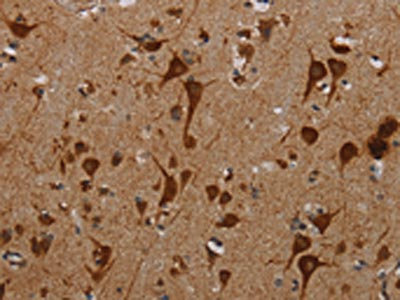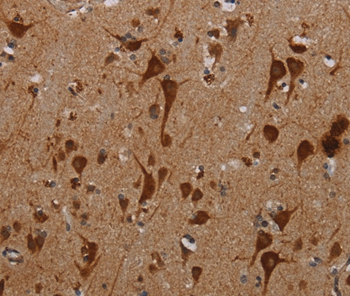
The image on the left is immunohistochemistry of paraffin-embedded Human brain tissue using CSB-PA965267(KMT2D Antibody) at dilution 1/40, on the right is treated with synthetic peptide. (Original magnification: x200)
KMT2D Antibody
CSB-PA965267
ApplicationsELISA, ImmunoHistoChemistry
Product group Antibodies
ReactivityHuman
TargetKMT2D
Overview
- SupplierCusabio
- Product NameKMT2D Antibody
- Delivery Days Customer20
- ApplicationsELISA, ImmunoHistoChemistry
- CertificationResearch Use Only
- ClonalityPolyclonal
- ConjugateUnconjugated
- Gene ID8085
- Target nameKMT2D
- Target descriptionlysine methyltransferase 2D
- Target synonymsAAD10, ALR, BCAHH, CAGL114, KABUK1, KMS, MLL2, MLL4, TNRC21, histone-lysine N-methyltransferase 2D, ALL1-related protein, Kabuki make-up syndrome, histone-lysine N-methyltransferase MLL2, lysine (K)-specific methyltransferase 2D, lysine N-methyltransferase 2D, myeloid/lymphoid or mixed-lineage leukemia 2, trinucleotide repeat containing 21
- HostRabbit
- IsotypeIgG
- Protein IDO14686
- Protein NameHistone-lysine N-methyltransferase 2D
- Scientific DescriptionThe protein encoded by this gene is a histone methyltransferase that methylates the Lys-4 position of histone H3. The encoded protein is part of a large protein complex called ASCOM, which has been shown to be a transcriptional regulator of the beta-globin and estrogen receptor genes. Mutations in this gene have been shown to be a cause of Kabuki syndrome.
- ReactivityHuman
- Storage Instruction-20°C or -80°C
- UNSPSC41116161




